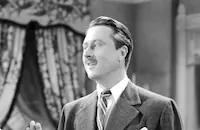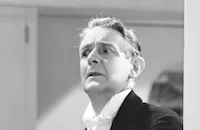Sweet and Low-Down

Brief Synopsis
Cast & Crew
Archie Mayo
Benny Goodman
Linda Darnell
Jack Oakie
Lynn Bari
James Cardwell
Film Details
Technical Specs

Synopsis
When clarinetist Benny Goodman and his band play their annual free concert at Chicago's Dearborn Settlement House, where Benny grew up, feisty youngster Tony Birch asks the famous musician to come to his house to listen to his older brother Johnny play trombone. When Benny demurs, Tony grabs his clarinet and dashes through the streets until he arrives at the Birch family's tenement apartment. Benny and his manager, Popsy, and pianist, Jess Stacy, are in hot pursuit, but when they hear Johnny play, their anger is forgotten and Benny and Jess jam with the talented young man. Benny offers Johnny a job, which the suspicious Johnny at first rejects, but his mother convinces him to accept. Popsy, who had wanted to become the band's next trombonist, is upset, but puts up with Benny's whim and introduces Johnny to the other band members at the train station. On the train, Johnny bumps into Pat Sterling, who he assumes is an autograph hound until Popsy reveals that she is the band's vocalist. After Johnny apologizes, Benny warns the flirtatious, sophisticated Pat to leave the naïve Johnny alone. The next day, the band prepares to perform at a military ball and are stunned when their host "General Carmichael" greets them and turns out to be a teenager from the local military academy. Benny gracefully sticks to his commitment, however, and Carmichael brings his adult aunt, Trudy Wilson, who calls him by his nickname, "Mogie," convinces Trudy to dress younger so that the other fellows will not know he does not have a real date. When she appears in her adolescent garb, even Benny, who knows Trudy's family, is surprised. Despite his nervousness, Johnny performs well, especially in the solos that Benny generously allows him. Benny confides in Trudy that he is worried that Johnny has the "wrong kind of confidence" and will easily be misled by Pat. Benny introduces Trudy to Johnny, hoping that she will win him away from Pat, but Johnny assumes that she is a teenager and Trudy laughingly perpetuates the charade. Later, Benny asks Trudy to visit the band in New York, but when she arrives, the jealous Pat tries to keep Johnny away from her. When he talks with Trudy, however, Johnny is impressed by her kindness and takes her to a jam session. Benny, knowing that Johnny is not ready, gently tells him not to join in, but Johnny gets angry and storms out. Trudy chastises Johnny for his temper, but the arrogant young man asserts that he is determined to become famous so that he can rise to her social level. As three months pass, Johnny's fame and ego grow, until one day, Pat takes him to meet her slick agent, Lester Barnes. Hoping to make a quick buck, Les asks Johnny to leave Benny and start his own band with Pat as his vocalist. Johnny agrees, although his family and Popsy criticize him for leaving Benny. Johnny steals Benny's musicians as well, and although business is good at first, Johnny does not have the appeal that Benny does and the crowds desert them. The men and Pat return to Benny, and although Johnny realizes the mistake he has made, he returns to Chicago and resumes his factory work. Later, Benny and the band play at the Settlement House, and Popsy goes to visit Johnny. The humbled musician admits that he should have treated Benny and Trudy better but still refuses to return to the band. Popsy finally carries Johnny to Benny's concert, and there, Johnny reconciles with both Benny and Trudy.

Director

Archie Mayo
Cast
Benny Goodman

Linda Darnell

Jack Oakie
Lynn Bari
James Cardwell

Allyn Joslyn
John Campbell
Roy Benson

Dickie Moore
Jess Stacy
Sid Weiss
Morey Feld
Buddy Swan
Beverly Hudson
Dorothy Vaughan
George Lessey
Ray Mayer
Billy Dawson
Harry Mckim
Robert Emmett Keane

Hope Landin
Robin Raymond

Cara Williams
Roger Clark
William Colby
Merrill Rodin
Judy Koford
Roberta Smith

Leonard Carey
Al Winters
Alex Pollard
Gerald Mackey
Woodrow Newbury
The Pied Pipers
Crew
Lucien Ballard
Joseph Bonime
Tiny Bradshaw
Mack Elliott
Richard English
Richard English
W. D. Flick
Benny Goodman
Benny Goodman
Mack Gordon
Edward Haldeman
Bill Harris
Charles Henderson
Edward Johnson
R. A. Klune
William Lebaron
Harry M. Leonard
Thomas Little
James V. Monaco
Wolfgang Amadeus Mozart
Emil Newman
Jack Palmer
Guy Pearce
Bobby Plater
Maurice Ransford
Walter M. Scott
Ernest Seitz
Dorothy Spencer
Gregory Stone
Harry Warren
Lyle Wheeler
Spencer Williams
Yvonne Wood
Saul Wurtzel

Film Details
Technical Specs

Award Nominations
Best Song
Articles
Sweet and Low-Down
The film was a fictionalized version of life with Goodman, his band, and their manager while entertaining at military camps. When a kid steals Goodman's clarinet, the chase ends up in a poor neighborhood, where they hear the thief's brother, Johnny (James Cardwell), playing the trombone. Since it's a Hollywood movie, Benny offers Johnny a job with the band. Throughout the course of the film, Cardwell provides the romantic interest with one of Fox's biggest leading ladies, Linda Darnell, who plays a socialite. Veteran comedian Jack Oakie (playing a fictionalized version of Goodman's real-life manager, William "Popsie" Randolph) provides the laughs and Benny Goodman provides the music, such as I'm Making Believe, written by James V. Monaco and Mack Gordon. The song would be a hit for Ella Fitzgerald and nominated for an Oscar®.
Lynn Bari seems to have been typecast by Fox as a big band singer, playing the role in Sun Valley Serenade and Archie Mayo's Orchestra Wives. Ironically, her voice had been dubbed in those films by Pat Friday and once again, she was dubbed, this time by Lorraine Elliot in Sweet and Low-Down. Bari wasn't the only one dubbed in the film; James Cardwell's trombone playing was ghosted by Bill Harris. Also in the cast is Dickie Moore, best known as one of The Little Rascals, who was now a teenager and had appeared in several Fox films in the 1940s, such as Heaven Can Wait (1943). The singing group The Pied Pipers and the great jazz pianist Jess Stacy also appear, but without screen credit.
Directed by Archie Mayo with a screenplay by Richard English (based on a story by English and Edward Haldeman) and with an uncredited screenwriting contribution by Benny Goodman himself, Sweet and Low-Down went into production on the Fox lot on January 24, 1944 and was finished a scant two months later. During filming, cinematographer Lucien Ballard had to skip work for a day to make a doctor's appointment and Darnell's real-life husband, Peverell Marley, photographed her kissing scene with James Cardwell.
This was not the first time that Benny Goodman and Jack Oakie had worked together. Oakie had a radio show in the mid-1930s called The Oakie College (a.k.a. The Camel Caravan) and Goodman was the house band. The program also featured a 12-year-old singer named Judy Garland.
Sweet and Low-Down was simply an excuse to bring the big band fans into the cinema to hear Goodman, and the critics knew it. Bosley Crowther, writing for The New York Times, saw that Fox was recycling the old formula. "You might not expect a deathless drama about a trombone player in Benny Goodman's band--nor even a fictional fable of outstanding motion-picture class. But certainly you should be permitted to expect something fresher on this theme than the weak and weary romance developed in Sweet and Low-Down [...]However, such is the routine which you are requested to take in this plainly machine-made picture, produced by Twentieth Century-Fox. In addition, you are suffered to bear with the wooden acting of James Cardwell as the Cinderella-styled trombonist and the mugging of Jack Oakie as his pal. Lynn Bari and Linda Darnell are decorative as the girls, and Mr. Goodman and his orchestra do make smooth music now and then. But the manner of Mr. Goodman, when not playing, rather plainly indicates that he knows this is all a boring fiction and not worthy of the talents of his band."
Linda Darnell certainly thought the film was a waste of her talents. The studio persisted in putting her into "sweet young thing" roles when she was yearning to show off her dramatic ability. The Los Angeles Examiner noticed, with columnist Dorothy Manners writing, "Lynn [Bari] comes off best because she has more of a chance to shine. Linda just doesn't have enough to do - although she looks beautiful doing it."
Producer: William Le Baron
Director: Archie Mayo
Screenplay: Richard English (screenplay); Richard English, Edward Haldeman (story); Benny Goodman (contributor to story, uncredited)
Cinematography: Lucien Ballard
Art Direction: Maurice Ransford, Lyle Wheeler
Music: Cyril J. Mockridge (uncredited)
Film Editing: Dorothy Spencer
Cast: Benny Goodman and His Band (Themselves), Linda Darnell (Trudy Wilson), Jack Oakie (Popsy), Lynn Bari (Pat Stirling), James Cardwell (Johnny Birch), Allyn Joslyn (Lester Barnes), John Campbell (Dixie Zang), Roy Benson (Skeets McCormick), Dickie Moore (Military Cadet General 'Mogie' Cramichael).
BW-83m.
by Lorraine LoBianco
SOURCES:
Crowther, Bosley "Sweet and Lowdown: Tromboner" The New York Times 19 Oct 44
Davis, Ronald L. Hollywood Beauty: Linda Darnell and the American Dream
The Internet Movie Database
Randolph, Michael Popular Music Through the Camera Lens of William "Popsie" Randolph

Sweet and Low-Down
Quotes
Trivia
Notes
The working titles of this film were The King of Swing and Moment for Music. According to information in the Twentieth Century-Fox Records of the Legal Department and Produced Scripts Collections, located at the UCLA Arts-Special Collections Library, Benny Goodman contributed to the original, unpublished screen story, "The King of Swing," by Richard English and Edward Haldeman, which was billed as a "musical biography" of Goodman. A June 21, 1943 Hollywood Reporter news item noted that the studio had purchased Goodman's "life story" for production. Although Goodman, who was popularly known as the "king of swing," and several of his band members play themselves in the picture, it is not a biography of Goodman, and documents in the legal records indicate that he did not want the picture to be a strict biography. In 1956, Steve Allen portrayed the famous clarinetist in The Benny Goodman Story, which was directed by Valentine Davies for Universal-International.
According to a June 1943 Hollywood Reporter news item, Irving Cummings was originally set to direct the picture, and in early January 1944, Hollywood Reporter noted that Gale Robbins had been set for the role of "Pat Sterling" and that Jane Ball was considered for the part of "Trudy Wilson." Although Hollywood Reporter production charts include June Haver in the cast, she does not appear in the finished picture. Studio records indicate that a sequence with Goodman and his band performing "Stompin' at the Savoy," composed by Goodman, Chick Webb and Edgar Sampson, was photographed but not included in the released film. Apparently the scene was shown in trailers for the picture. James V. Monaco and Mack Gordon received an Academy Award nomination for their song "I'm Making Believe."














